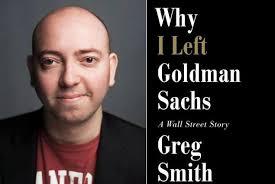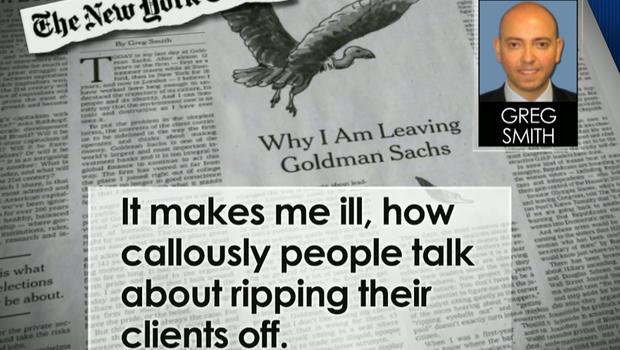Submitted by literature on


Wall Street Ethics. Millions of people worldwide are involved in trading almost $5.3 trillion per day at the market, but has anyone ever pondered over how much profit does the investment banks make? Let alone this, how much turnover do you actually make? Is it 50%? If yes, then you are outperforming the average profit of almost 76% of the traders worldwide. In this scenario if you realize that the bank initiating the investment is making 100% profit quarterly by trading your money, how would you feel? This is not fiction it’s based on facts. Do you feel cheated? Do you feel condemned?
It was the March of 2012 when “Why I Left Goldman Sachs”, by Greg Smith was published in the New York Times and immediately became viral because of it’s honest and transparent take on Goldman Sachs, the investment banking shark and it’s principle. Later that year in October it was published as a book which created even more controversy and the review I’m writing about is a lecture he delivered at Stanford Graduate School of Business in 2013 organized by the “Centre for Ethics and Society”.
In the lecture he talks about his experiences and attributes which drove him to leave Goldman Sachs. In the beginning he adds. It is not just aiming at Goldman Sachs but also it’s equivalents and the book he wrote acts as a prism as to what he sees in the organization and what went wrong. He himself was a student at the Stanford Graduate School of Business, and had been working at Goldman Sachs since fifteen years, until he resigned. He adds that the scenario and the aim of the Investment Banks have changed drastically as their has been a culture shift from “LONG TERM GREEDY” to “SHORT TERM GREEDY”, in the prior the bank aims for long term profits by treating their clients as partners, securing their trust for long term relations, while in the former it treats the clients as a source for information for privatization of profits thus creating a toxic society which no one can trust.
In the lecture a swell as the book he highlights the unethical behaviour of the banks. He accomplishes this by comparing Wall Street to a Casino to add that as investors we think that rules are intangible and there are scrutiny to monitor the same and an investment bank is dealing cards on the funds as tables with hundreds of millions of dollars of investors, while the dealer observes but doesn’t place his bets on this information, although, this is not true when we come to banks which places it’s bets with our information earning 100% profits since they then have a smarter decision and control at the market. Secondly, he adds some banks like Meryl lynch etc gamble in the dark with no monitors to check wins and losses, thus having even greater risks than usual. He says “it is ethical to bring the business into the light for transparency and global prosperity.” Lastly and most importantly Trust. We know that the dealer or the Bank knows all the rules of their game and we trust them implicitly. It is not expected of them to mislead us by sharing wrong information or rules because they are supposed to be on our side. But this is not the case with banks cause they sometimes share information which serves otherwise even though they know it’s unethical just to make huge profit of it. And the real dilemma is that it is not an illegal act which causes “The Big Misunderstanding,” proved in the SEC Lawsuit against Goldman Sachs in 2010. In which the big misunderstanding was created due incomplete disclosure of intentions and misleading advice with the clause that “THEY ARE BIG BOYS” out to play and should endure what is coming towards them since they are expected to act upon discretion and not influence. Even though the Banks had Fiduciary Duty towards them. Fiduciary Duty is owed by the banks which is, if they are asked for advice then they owe Fiduciary obligation to show the correct path highlighting what would be good and what would be bad for us. Although it is advocated nowadays as not owed to anyone opposed to the basic principle of working for the benefit of the clients.
He says that it was the real Ethical Dilemma as to what is ethical v/s what is illegal. He adds that this was the reason which led him to leave. He says that if something is technically legal in the sense that nobody will hang them for the deed but not ethically permissible, people do that deed. He explains further with two examples.
For example, Red Cross Society and other charities which works for donations for causes came to trading bank to trade some complicated derivative product which would pay the firm millions of dollars yet it was not in their interest but not a punishable offence since they were classified sophisticated under law, even though it is ethically inappropriate but nowadays most of the firms would do it! Also, during the European Sovereign Crisis in 2011, when Italy, Portugal and Greece were thriving form Bankruptcy, he said that they were asked to convince some of the biggest investors to invest in European Banks just to sell them to buyers as they didn’t like it. He adds that when millions of people were affected in the European Union cause their governments could not put their act together, these banks were trying to make money out of such a scenario by making business for the quarter. It was this incident where the banks had crossed the line between level of law and spirit of law and between ethical and legal, leading him to leave the firm, he adds.
He explains that it is not the dilemma which is important anymore but also, what needs to change. He adds that this is because the government doesn’t want to take the risk of failing the banks thus the banks have the liability to do what they wish, to maximize profits, leading to privatization of profits and socialization of downside risk. He is most outraged against the fact that the big sharks of Banking, fund the Senate Banking Committee, there hundreds of billions of dollars are levied to kill regulation which according to him is very counter intuitive. By killing Greg adds, is not to get rid of the law or to get it scraped off the Act but to feed it up, which is usually done by adding hundreds of loopholes and amendments ultimately leading to the consequence that that the law becomes so complicated that no one is actually able to follow it. This at the end of the day makes the situation intangible.
Thus he says that as he has added in his book that to actually change the situation it is essential to point back at the politicians, as to why aren’t they being able to solve the actual problem or are they incapable of solving it? He advocates that Banks can still be profitable even if 80% of their profits do no come from trading but the actual work they advertise to the investors. He pleads the Banks and the politicians to be honest and transparent with public and also to return back to the Long term model. Secondly, he holds the people who do things that risk the system safety of the economy, accountable for the privatization of profits and unethical business. To which he adds, to be transparent and everything should be under light. As well as, strict outlawing of proprietary trading i.e banks trading with their money, to earn profits. By following these he added, we may be able to avoid it.
Lastly, he added that the people working in trading are usually fundamentally very strong, but often step over lines about what is ethical and what is legal. And Unethical Wall Street is not just about a few bad people making bad ethical decisions but a whole system which doesn’t discourage such decisions but incentivise people to make them.
-Insight by Aishwarya Gupta


